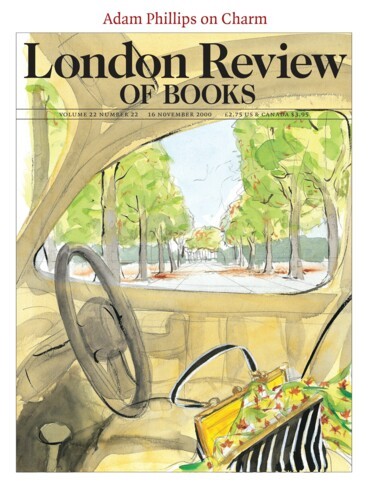The spoof memoir Augustus Carp, Esq. by Himself: Being the Autobiography of a Really Good Man was first published anonymously in 1924. Carp is a pious, hypocritical, gluttonous, not very bright and, yes, carping resident of Camberwell, and the narrator of what Anthony Burgess called ‘one of the great comic novels of the 20th century’. He begins one recollection of his childhood with a description of how he was ‘happily employed combing a grey rabbit, to which I was deeply attached, and which I had named, but a day or two previously, after the major prophet Isaiah’. That use of ‘major’ speaks volumes. Twenty years ago, Burgess persuaded Heinemann to bring out a new edition, and in the process discovered that the author was Dr Bashford, a Post Office medical officer from Hampstead who went on to become Honorary Physician to George VI. Whether or not this meant he was expected or even allowed to combat the King’s diseases I don’t know; either way it didn’t stop him getting a knighthood. His name doesn’t appear on the cover of the most recent edition of Augustus Carp (Prion, £8.99), but he is acknowledged on the title page, and his potted biography is in Robert Robinson’s introduction. Carp, unlike his author, has no pretensions to modesty:
It is customary, I have noticed, in publishing an autobiography, to preface it with some sort of apology. But there are times, and surely the present is one of them, when to do so is manifestly unnecessary. In an age when every standard of decent conduct has either been torn down or is threatened with destruction; when every newspaper is daily reporting scenes of violence, divorce and arson; when quite young girls smoke cigarettes and even, I am assured, sometimes cigars; when mature women, the mothers of unhappy children, enter the sea in one-piece bathing-costumes; and when married men, the heads of households, prefer the flicker of the cinematograph to the Athanasian Creed – then it is obviously a task, not to be justifiably avoided, to place some higher example before the world.
Carp would have been appalled by the goings-on in Martin Amis’s Dead Babies – all kinds of sex, all kinds of drugs, all kinds of violence, if little or no arson – which was written a mere fifty years later, and has just been adapted for the cinematograph and directed by William Marsh. It’s due for release in January 2001. The film-makers encountered various difficulties along the way, not least raising money, though location was apparently a problem, too. As Richard Holmes, one of the producers and nothing so far as I know to do with the Romantic biographer, put it: ‘Imagine turning up to a little old lady’s house and asking if it would be OK to shoot dead babies in her home.’ Well quite. They got round that one by using as a working title ‘The Martin Amis Project’. There are plenty of references in Dead Babies to other films, a more or less obligatory practice these days. Giles’s mad mother lives at Castle Howard (a.k.a. Brideshead), and at one point Johnny the psycho is about to blow the lock off a door with a shotgun when he thinks better of it and instead smashes in one of the panels with a handy statuette of the Virgin. He then fools the audience by not impersonating Jack Nicholson: he doesn’t poke his head through and say: ‘Here’s Johnny!’ The movie catches the mood of the novel remarkably well, even though the sex and violence have been toned down, and Keith, the hideous, hapless dwarf, is taller on screen than the 4'11" he rises to on the page – nearer, in fact, to the 5'6" he considers the boundary between short and tall, which also happens to be the height, according to Experience, of Amis himself.
Marsh has said of Dead Babies: ‘Basically it’s a reworking of an Agatha Christie whodunnit, it’s just that it’s set in a hyper-real world.’ The same could be said of Pierre Bayard’s Who Killed Roger Ackroyd? (Fourth Estate, £10), which first appeared in France a couple of years ago, to be greeted by Le Monde as ‘the most exciting mystery story of the year’ and ‘a clever investigation into the art of reading’, based as it is on the idea that Hercule Poirot might have got it wrong. French intellectuals have long been fascinated by Christie’s novel: Barthes, Gérard Genette, Algirdas Julien Greimas and Robbe-Grillet have all discussed it, and Perec was writing about it ‘on the eve of his death’. Bayard’s solution, a perfectly valid reading, is, remarkably, much more satisfying than Poirot’s. If you find this kind of thing fun, you’re probably already familiar with John Sutherland’s Was Heathcliff a Murderer?, Can Jane Eyre Be Happy? and Who Betrays Elizabeth Bennet? but you might be interested to know they’ve been collected in an omnibus edition with a new introduction, under the title The Literary Detective (Oxford, £12.99), in plenty of time for Christmas. And if you go to see Dead Babies, bear in mind that Marvell is played by the director, and that despite Quentin’s voice-over in the film, none of the characters in the novel is the narrator.
Send Letters To:
The Editor
London Review of Books,
28 Little Russell Street
London, WC1A 2HN
letters@lrb.co.uk
Please include name, address, and a telephone number.

